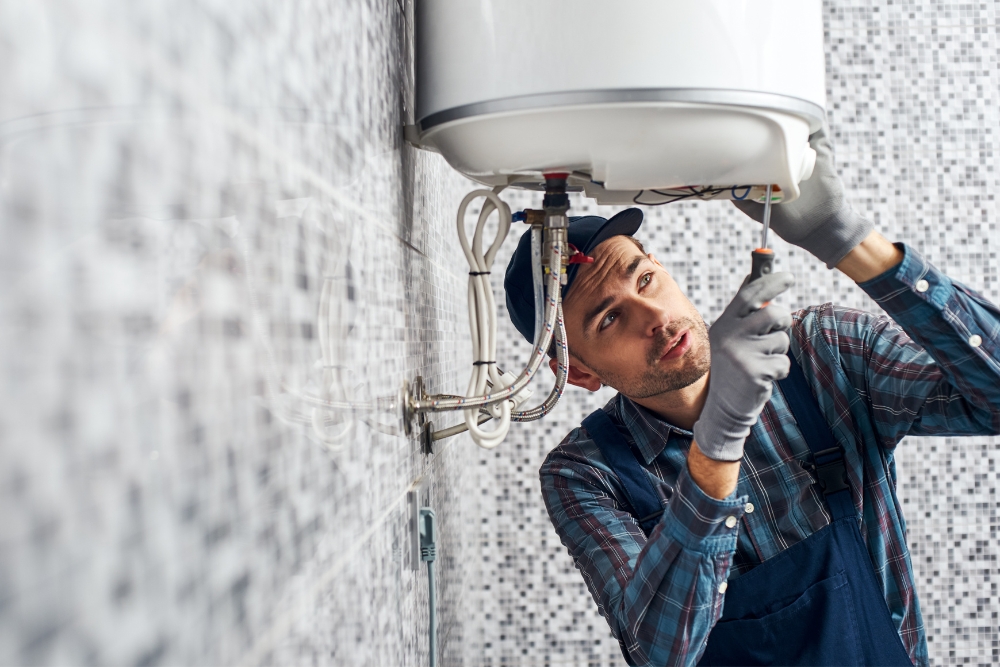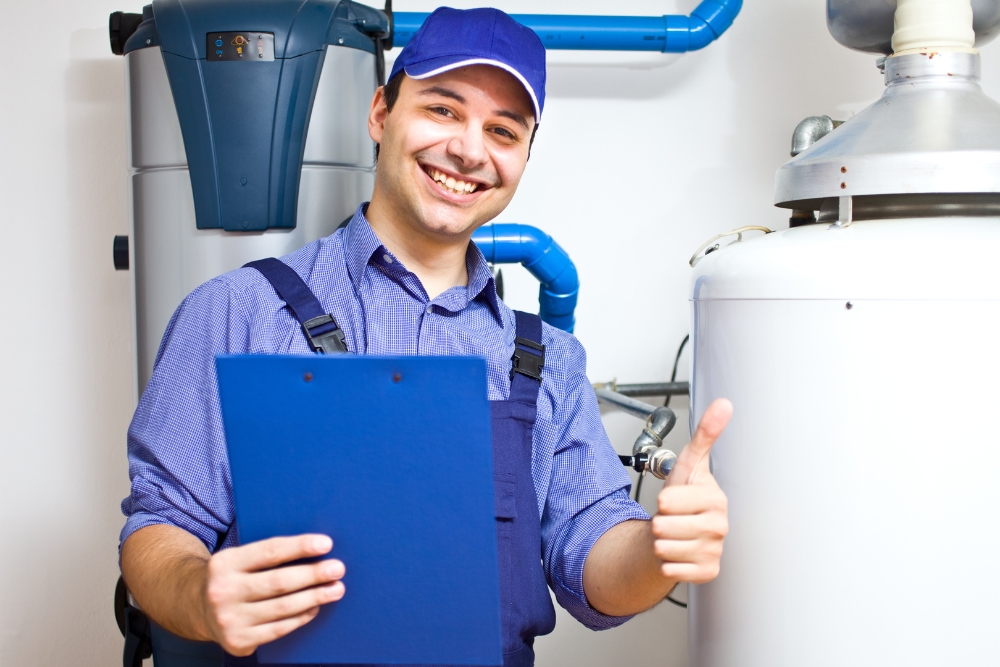We’ve all had that moment of dread – stepping into what you expect to be a steamy escape, only to be greeted by an icy spray that’d make even a penguin shiver. It’s more than just a nippy nuisance; it’s your hot water system waving the white flag.
With Aussie households forking out roughly 25% of their energy bill on hot water alone, it’s no wonder we’re all on the hunt for wallet-friendly fixes. We’ve done the hard yards and uncovered some top-notch advice to keep your showers warm and your expenses cool.
Key Takeaways
- Regular maintenance and DIY repairs, such as checking for leaks and flushing out sediment, can prevent costly water heater issues.
- Installing energy-efficient systems like gas-powered or solar water heaters can lead to long-term savings on energy bills.
- Replacing old, outdated water heaters with modern units or considering tankless options improves efficiency and reduces costs.
- Seeking professional advice ensures proper size selection and installation of your water heater, avoiding unnecessary expenses.
- Taking advantage of government incentives for installing eco-friendly systems like solar can further reduce the financial impact.
Common Issues with Hot Water Heaters
Water heaters can present a variety of common issues, such as high energy bills, leaks, and a shorter supply of hot water. These problems can be frustrating and costly, but with the tips provided in this blog post, you can effectively address these issues without breaking the bank.

High energy bills
Getting hit with high energy bills each month can be tough on our wallets, especially when they’re linked to an inefficient hot water system. It’s a clear sign that something might not be right.
Maybe the heater is working overtime due to sediment build-up or its outdated design just isn’t keeping up with our needs for efficient hot water usage. These are cost drains we need to plug in quickly.
We can take control by tweaking electric water heater controls or ensuring gas-powered hot water systems are burning cleanly and efficiently. Regular maintenance checks could reveal small issues before they become big problems, saving us a stash of cash in the long run.
Let’s also keep an eye out for failing components—if fixing them early means preventing heat loss, we’ll see immediate savings reflected in our next bill. Keeping those costs down is all about staying alert and taking action without delay.
Leaks
If you notice leaks coming from your water heater, it’s important to take action promptly. Leaks can lead to water damage and mould growth if left unaddressed. Begin by inspecting the pressure relief valve, as a faulty valve could be causing the leak.
If the valve is working properly, check for loose connections or cracks in the tank itself. Use a pipe wrench to tighten any loose fittings and consider applying a sealant to small cracks.
It’s crucial to address leaks immediately to prevent further damage and avoid higher repair costs down the line.
Regular maintenance can help prevent leaks by identifying potential issues early on. This includes checking for corrosion, flushing sediment build-up, and ensuring all components are functioning correctly.
Shorter hot water supply
If you’re experiencing a shorter hot water supply, there are a few simple troubleshooting steps to take before calling in a professional. First, check the thermostat settings on your water heater and ensure they are properly configured for your household’s needs.
Next, consider flushing out any sediment that may have built up in the tank, as this can affect the heating capacity. It’s also important to inspect for any leaks or issues with the hot water pipes that could be contributing to the problem.
In addition, consider adjusting your hot water usage habits by spacing out showers and laundry loads throughout the day rather than all at once. This can help ensure that everyone in your household has access to an adequate supply of hot water without overtaxing your system.
Cost-Effective Tips for Hot Water Heater Repair
When it comes to cost-effective water heater repair, DIY testing and maintenance can save you money in the long run. Regular maintenance and timely replacement of faulty parts can also prevent major issues and minimise repair costs.
Consider switching to a more efficient power source for your water heater to help reduce energy bills.
DIY testing and repair
When dealing with water heater issues, try DIY testing and repair. Here are some cost-effective tips for maintaining and repairing your water heater system:
- Regularly check for leaks and drips around the water heater unit to identify any potential issues.
- Test the temperature-pressure relief valve by lifting the lever partway and releasing it to ensure proper functioning.
- Drain a few gallons of water from the tank to remove sediment buildup at least once a year.
- Inspect the anode rod for corrosion and replace it if necessary to extend the life of your water heater.
Regular maintenance
After conducting DIY testing and repair, it’s essential to prioritise regular maintenance for your water heater. Consistently checking the system for signs of wear and tear can prevent costly repairs later on.
This includes flushing the tank to remove sediment build-up and checking for any leaks in the system. Additionally, scheduling an annual tune-up by a professional can help ensure that your water heater operates efficiently, saving you money on energy costs in the long run.
Regular maintenance also involves inspecting the heating elements and thermostat regularly to ensure they are functioning optimally. By keeping up with this routine, you can extend the lifespan of your water heater while reducing the likelihood of unexpected breakdowns or replacements.
Replacement of faulty parts
After regular maintenance, it’s important to address any faulty parts in your water heater. Here are cost-effective tips for replacing faulty parts:
- Identify the faulty part: When experiencing issues with your water heater, pinpoint the specific part that needs replacement. This could be a broken heating element, a malfunctioning thermostat, or a leaking pressure relief valve.
- Purchase quality replacements: Invest in high-quality replacement parts to ensure durability and optimal performance. Cheap or substandard components may lead to frequent repairs and increased costs in the long run.
- Follow manufacturer’s guidelines: When replacing faulty parts, adhere to the manufacturer’s instructions and specifications. This will help maintain the efficiency and safety of your water heater.
- Seek professional advice if needed: If you’re unsure about how to replace certain parts or encounter complex issues, seek assistance from a qualified technician. DIY repairs should only be attempted if you have the necessary skills and knowledge.
- Regular inspection after replacement: After replacing any faulty parts, regularly inspect and monitor your water heater to ensure that all components are functioning properly and efficiently.
- Consider warranty coverage: Check if your water heater is still under warranty as some faulty parts may be covered for replacement at no additional cost.
- Preventive measures: Implement preventive measures such as installing a sediment filter or using anode rods to prolong the lifespan of your water heater’s components.
Consider switching to a more efficient power source
To save money on hot water heating, it’s worth considering switching to a more efficient power source. Upgrading to a gas-powered or solar hot water system can significantly reduce energy costs in the long run.
Gas-powered systems are generally more cost-effective than electric ones, while solar systems utilise renewable energy, making them an environmentally friendly and economical choice for homeowners.
Making the switch to a more efficient power source can lead to significant savings on your hot water bill and contribute to reducing your household’s carbon footprint.

When to Consider Hot Water Heater Replacement
If the cost of repairs exceeds the value of your current water heater, it may be time to consider a replacement. Additionally, if your unit is old and outdated, it might be more cost-effective in the long run to invest in a new, more energy-efficient system.
High repair costs
Repairing a water heater can be costly, especially if multiple parts need replacement or if the system requires extensive repairs. To minimise these expenses and avoid financial strain, we recommend exploring cost-effective options such as DIY testing and repair, regular maintenance, and switching to a more efficient power source.
By being proactive in addressing any issues early on and seeking professional advice when needed, homeowners can potentially save money on high repair costs while ensuring their water heater operates efficiently.
Water heater replacement may become necessary when faced with high repair costs. Old and outdated units that continually require expensive fixes may no longer be cost-effective in the long run, making it essential to explore modern energy-efficient alternatives or installation of solar hot water systems for potential long-term savings.
Old and outdated units
After considering the high repair costs of an aging water heater, it’s important to also assess if your unit is old and outdated. Older units tend to be less energy-efficient and may require more frequent repairs.
Upgrading to a newer model can not only improve the efficiency of your hot water system but also reduce energy costs in the long run. If you have an older gas-powered unit, switching to a more modern electric or solar-powered option could potentially save you money on operating expenses each month.
Seeking professional advice before deciding between replacing an old water heater is essential. They can help determine whether it’s time for an upgrade based on both efficiency and safety concerns.
Tips for Saving Money on Hot Water Heating
To save money on hot water heating, it’s important to research before purchasing a new unit, consider installing a solar hot water system, choose the right size for your home, use a tankless water heater, and seek expert advice.
These tips can help you minimise costs while still enjoying efficient hot water for your household needs.
Properly researching before purchasing a new unit
Before making a decision, we should meticulously research different water heater options. Understanding the varying features and energy efficiency of each model is crucial in finding the best fit for our home.
It’s important to consider factors such as heating capacity, warranty coverage, and long-term energy savings when comparing different units.






